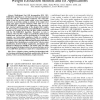Free Online Productivity Tools
i2Speak
i2Symbol
i2OCR
iTex2Img
iWeb2Print
iWeb2Shot
i2Type
iPdf2Split
iPdf2Merge
i2Bopomofo
i2Arabic
i2Style
i2Image
i2PDF
iLatex2Rtf
Sci2ools
141
click to vote
TSP
2010
2010
Multichannel fast QR-decomposition algorithms: weight extraction method and its applications
Abstract--Multichannel fast QR decomposition RLS (MCFQRD-RLS) algorithms are well known for their good numerical properties and low computational complexity. The main limitation is that they lack an explicit weight vector term, limiting themselves to problems seeking an estimate of the output error signal. This paper presents techniques which allow us to use MC-FQRD-RLS algorithms with applications that previously have required explicit knowledge of the adaptive filter weights. We first consider a multichannel system identification setup and present how to obtain, at any time, the filter weights associated with the MC-FQRD-RLS algorithm. Thereafter, we turn to problems where the filter weights are periodically updated using training data, and then used for fixed filtering of a useful data sequence, e.g., burst-trained equalizers. Finally, we consider a particular control structure, indirect learning, where a copy of the coefficient vector is filtering a different input sequence than th...
Related Content
| Added | 22 May 2011 |
| Updated | 22 May 2011 |
| Type | Journal |
| Year | 2010 |
| Where | TSP |
| Authors | Mobien Shoaib, Stefan Werner, José Antonio Apolinário |
Comments (0)

